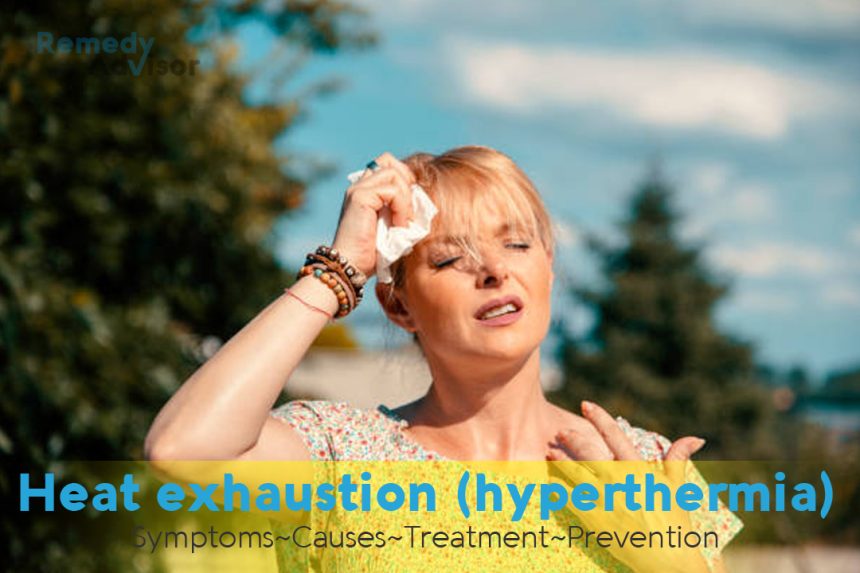What is it
Exposure to heat and humidity can pose a serious health problem, especially during summer months when the temperature is regularly above 70°F and the humidity is often greater than 70 percent. Heat exhaustion, also known as heat prostration or hyperthermia, is the excessive loss of body fluids and salt, combined with a sharp rise in body temperature (up to 103°F). The condition is generally temporary and rarely fatal. Unless the case is severe or the person has a heart condition, it is often possible to relieve symptoms without calling your doctor.
Symptoms
- Profuse sweating.
- Pale, moist, clammy skin.
- Weakness and fatigue.
- Headache.
- Dizziness.
- Muscle cramps.
- Intense thirst.
- Darkened urine.
- Nausea and vomiting.
What causes it
Perspiration, and the evaporation of perspiration, is the main way the human body cools itself in the heat. Indeed, humans can sweat as much as four quarts an hour. But when relative humidity increases, the air becomes saturated with water vapor, reducing the effectiveness of sweat evaporation to cool you down. At 100 percent relative humidity, evaporation stops completely. The accumulation of sweat on your skin may also close your sweat ducts, thus allowing your skin to become hot and dry. Without sweat evaporation, your body temperature starts to increase.
Hyperthermia can also occur in dry climates, where sweat can evaporate so rapidly that you may lose a tremendous amount of fluid before you realize it. Dehydration can occur in a short time or develop over several days. If you exercise under these conditions and don’t drink flu- ids, your body will not be able to produce enough sweat to cool itself.
Contributing to hyperthermia is the fact that thirst is satisfied long before you have replenished lost fluids. If, after prolonged exercise, you replace fluids only when you are thirsty, it can take several days to reestablish your body’s fluid balance.
What if you do nothing
If heat exhaustion is allowed to persist and too much fluid is lost through perspiration, heat exhaustion can rapidly become heat strode, an emergency condition that can lead to death if not quickly treated.
Home remedies
Stop whatever you’re doing
Once you feel overheated, stop your activity. Continuing to push your-self will worsen the situation, and it may escalate to heat stroke. Instead, go to a cool place, he down, and elevate your feet slightly so that more blood will flow to the brain.
Drink plenty of fluids
You need to drink enough to replace the fluid you’ve sweated off Plain water is best. Start by drinking 16 to 20 ounces of fluid. If you feel dizzy, sip the drink or, alternatively, suck on ice cubes.
Cool yourself
Take a tepid bath or shower. If you have air conditioning or a fan, use it. The cool environment will help to lower your body temperature and speed recovery.
Prevention
Dress properly
To permit maximum evaporation of perspiration in hot weather, wear light, loose-fitting clothing that “breathes” and allows as much skin exposure as possible.
Hydrate yourself
The most important thing is to drink even if you don’t feel thirsty. Thirst is satisfied long before you have replenished all the lost fluids, so continue to drink.
When you are planning to exercise in the heat, be sure to drink at least 1 6 to 20 ounces of fluid two hours prior to your workout, and another 8 ounces 1 5 to 30 minutes before you begin the workout. While you exercise, drink 4 to 8 ounces every 10 to 20 minutes.
Restrict your outdoor activities
When the weather is hot and humid, try to schedule your more vigorous activities for the early morning or late evening, if possible. Also, consider indoor exercise as an alternative. (The table below lists the “apparent temperature” how hot it feels at various combinations of heat and humidity, along with the dangers posed by physical activity and/or prolonged exposure.)
Acclimate yourself
If you must compete in an athletic event or perform strenuous work when the temperature and humidity are high, slowly acclimate yourself to the weather Allow yourself 10 to 14 days of daily work in hot weather to adjust, gradually spending more time in the heat.
Don’t take salt tablets
You lose proportionately more water than sodium when you sweat in the heat Extra salt is unnecessary you already get enough from your daily diet and it is potentially dangerous because it helps draw water from the tissues into the stomach, the water helps dilute the increased sodium coming from the tablets. This can quickly lead to dehydration.
Limit caffeine and alcohol. Caffeine, found in coffee, tea, and soft drinks, is a diuretic and can cause excessive water loss through increased urination; the same is true for alcoholic beverages.
Weigh yourself daily
During hot weather, weigh yourself every morning after going to the bathroom. If your body weight is two pounds lower than the previous day, you may be dehydrated. You need to drink more water before being active outside again.
Don’t skip any meals
Eating helps keep you hydrated. Food contains water, and it also increases the concentration of sugars and salt in the blood, thereby activating thirst.
Be prepared in cold conditions as well as in the heat
While heat buildup may be slower when you exercise in cold weather or in water, you still lose fluid from sweating. Therefore, it’s important to replace fluids just as regularly when you swim or exercise in the cold as you do in the heat.
Consult your physician if you’re on medication
If you are taking antihistamines, beta-blockers, calcium channel blockers, anticholinergic drugs, diuretics, antidepressants, or antiparkinsonian drugs, speak to your doctor before undertaking activities in the heat. Some drugs can cause dehydration.







